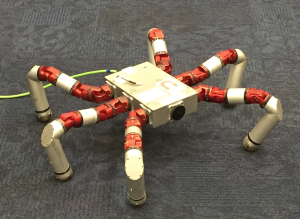
Modular walking robot from Howie Choset’s Biorobotics Lab at Carnegie Mellon University.
In celebration of the fifth anniversary of the National Robotics Initiative (NRI), the Congressional Robotics Caucus Advisory Committee including IEEE-USA, Computing Research Association, Carnegie Mellon University, and Georgia Tech with support from the National Science Foundation (NSF) held a Congressional Briefing with demonstrations and the Computing Community Consortium (CCC) released it’s report called Next Generation Robotics.
The NRI was a direct result of a CCC roadmapping effort led by Henrik Christensen of Georgia Tech. It is based on a definitive report, A Roadmap for US Robotics — From Internet to Robotics, developed by more than 100 robotics experts from industry and academia who in 2008 attended four CCC workshops, one in each four topic areas of robotics: manufacturing and logistics, healthcare and medical robotics, service robotics, and emerging technologies.
The goal of the NRI is to “accelerate the development and use of robots that work besides or cooperatively with people in the United States.” NRI is coordinated by NSF, but with active involvement and support from NSF, National Aeronautics and Space Administration (NASA), U.S. Department of Agriculture (USDA), National Institutes of Health (NIH), the Department of Defense (DOD), the U.S. Department of Energy (DOE) and Office of Science Technology Policy (OSTP). The first year of funding (FY12) NRI funded 61 proposals at a total of over $40M/year. Since then, more than 200 proposals have been sponsored at a total of more than $150M by the partner agencies.
Earlier this year, in order to provide and update to the community, the CCC sponsored two workshops, again led by Henrik Christensen, to assess what are the main trends, what has happened in the last five years, and what may be promising directions for the future of the NRI. They found, as they stated in their report Next Generation Robotics, that the NRI has helped to explore the possible spectrum of robotics applications, and it has, in particular, introduced human-robot interaction as a first class concept in the field. However, they also found, that the NRI has posed new problems and barriers.
Taking the next steps toward the future relies on fundamental research across many disciplines, as well at the integrative science to draw that work together. As robots move from highly structured environments, and begin to interact with the real world, we foresee barriers that current methods and technologies cannot overcome. As the application space scales, the need for better sensing, better actuation, and more general planning, reasoning, and learning will become paramount. The ability to rapidly architect, implement, deploy, and adapt new systems to new problems will require new concepts in software, and new methods of integration.
Read the full report to learn more.
The CCC is excited to be a part of the future of robotics and is looking forward to seeing what comes next in this new phase of educational and economic opportunities created by robots.









